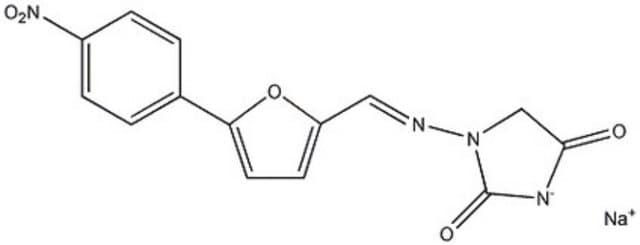SML3714
SMIP004-7
≥98% (HPLC)
Synonym(e):
2-Methyl-4-butylaniline, 4-Butyl-2-methylaniline, 4-Butyl-2-methylbenzenamine
Anmeldenzur Ansicht organisationsspezifischer und vertraglich vereinbarter Preise
Alle Fotos(2)
About This Item
Empirische Formel (Hill-System):
C11H17N
CAS-Nummer:
Molekulargewicht:
163.26
MDL-Nummer:
UNSPSC-Code:
12352200
NACRES:
NA.21
Empfohlene Produkte
Qualitätsniveau
Assay
≥98% (HPLC)
Form
(Oil or liquid)
Farbe
colorless to brown
Lagertemp.
-10 to -25°C
Biochem./physiol. Wirkung
SMIP004-7 is a cell penetrant, potent and selective ubiquinone uncompetitive inhibitor of mitochondrial Complex I (NADH:ubiquinone oxidoreductase). SMIP004-7 selectively binds to a distinct N-terminal region of Complex I catalytic subunit NDUFS2, which leads to rapid disassembly of Complex I. SMIP004-7 potently inhibits growth of triple-negative breast cancer xenografts in mice.
Lagerklassenschlüssel
11 - Combustible Solids
WGK
WGK 3
Flammpunkt (°F)
Not applicable
Flammpunkt (°C)
Not applicable
Analysenzertifikate (COA)
Suchen Sie nach Analysenzertifikate (COA), indem Sie die Lot-/Chargennummer des Produkts eingeben. Lot- und Chargennummern sind auf dem Produktetikett hinter den Wörtern ‘Lot’ oder ‘Batch’ (Lot oder Charge) zu finden.
Besitzen Sie dieses Produkt bereits?
In der Dokumentenbibliothek finden Sie die Dokumentation zu den Produkten, die Sie kürzlich erworben haben.
Elizabeth Rico-Bautista et al.
Oncotarget, 4(8), 1212-1229 (2013-08-02)
We previously identified SMIP004 (N-(4-butyl-2-methyl-phenyl) acetamide) as a novel inducer of cancer-cell selective apoptosis of human prostate cancer cells. SMIP004 decreased the levels of positive cell cycle regulators, upregulated cyclin-dependent kinase inhibitors, and resulted in G1 arrest, inhibition of colony
Gabriela Reyes-Castellanos et al.
Trends in pharmacological sciences, 43(9), 706-708 (2022-04-07)
Targeting metabolic reprogramming has proven successful in oncology, but this field requires better identification of drugs that inhibit mitochondrial metabolism in cancer cells. Recent work from Dr Wolf's group reveals that the primary target of the antitumor compound SMIP004-7 is
Metabolic targeting of cancer by a ubiquinone uncompetitive inhibitor of mitochondrial complex I
Cell Chemical Biology, 29(3), 436-450 (2022)
Unser Team von Wissenschaftlern verfügt über Erfahrung in allen Forschungsbereichen einschließlich Life Science, Materialwissenschaften, chemischer Synthese, Chromatographie, Analytik und vielen mehr..
Setzen Sie sich mit dem technischen Dienst in Verbindung.






